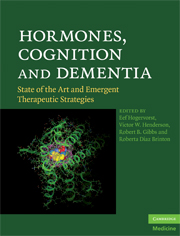Book contents
- Hormones, Cognition and Dementia
- Hormones, Cognition and Dementia
- Copyright page
- Contents
- Contributors
- Preface
- Section 1 Estrogens and cognition: perspectives and opportunities in the wake of the Women's Health Initiative Memory Study
- Section 2 Varieties of estrogenic therapy
- Section 3 Potential modulators and modifiers of estrogenic effects
- Section 4 Possible genetic factors related to hormone treatment effects
- Chapter 15 Possible genetic polymorphisms related to sex steroid metabolism and dementia in women
- Chapter 16 Genetics related to sex steroids: implications for Alzheimer's disease
- Chapter 17 Apolipoprotein E, hormone therapy, and neuroprotection
- Chapter 18 Testosterone, gonadotropins, and genetic polymorphisms in men with Alzheimer's disease
- Section 5 Testosterone, estradiol and men, and sex hormone binding globulin
- Section 6 Gonadotropin effects
- Index
- Plate Section
Chapter 17 - Apolipoprotein E, hormone therapy, and neuroprotection
from Section 4 - Possible genetic factors related to hormone treatment effects
Published online by Cambridge University Press: 06 July 2010
- Hormones, Cognition and Dementia
- Hormones, Cognition and Dementia
- Copyright page
- Contents
- Contributors
- Preface
- Section 1 Estrogens and cognition: perspectives and opportunities in the wake of the Women's Health Initiative Memory Study
- Section 2 Varieties of estrogenic therapy
- Section 3 Potential modulators and modifiers of estrogenic effects
- Section 4 Possible genetic factors related to hormone treatment effects
- Chapter 15 Possible genetic polymorphisms related to sex steroid metabolism and dementia in women
- Chapter 16 Genetics related to sex steroids: implications for Alzheimer's disease
- Chapter 17 Apolipoprotein E, hormone therapy, and neuroprotection
- Chapter 18 Testosterone, gonadotropins, and genetic polymorphisms in men with Alzheimer's disease
- Section 5 Testosterone, estradiol and men, and sex hormone binding globulin
- Section 6 Gonadotropin effects
- Index
- Plate Section
Summary
Struble and McAsey propose that apolipoprotein E (APOE) is a pivotal required intermediary in the neuroprotective effects of hormone replacement therapy (HT) not only in dementia but in other chronic neurological diseases. Basic science analyses indicate that 17β-estradiol increases APOE expression, which facilitates neuronal plasticity, neural repair, and could delay progression of several types of neurodegenerative disease. The issue of the APOE4 isoform, which may be a negative regulator of HT outcomes, is considered along with therapeutic implications for either increasing or decreasing its expression. These authors propose that subsequent studies of the impact of HT or selective estrogen receptor modulators on neurological function should include APOE genotyping.
- Type
- Chapter
- Information
- Hormones, Cognition and DementiaState of the Art and Emergent Therapeutic Strategies, pp. 162 - 170Publisher: Cambridge University PressPrint publication year: 2009

